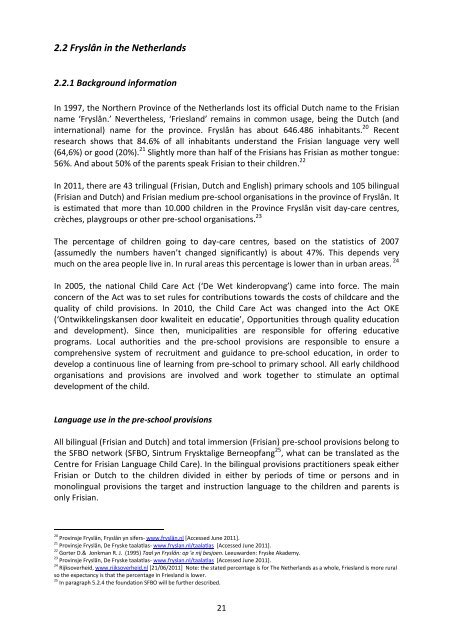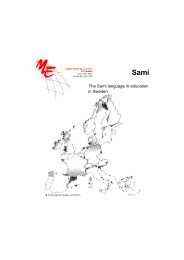Multilingual Early Language Transmission (MELT) - Mercator ...
Multilingual Early Language Transmission (MELT) - Mercator ...
Multilingual Early Language Transmission (MELT) - Mercator ...
Create successful ePaper yourself
Turn your PDF publications into a flip-book with our unique Google optimized e-Paper software.
2.2 Fryslân in the Netherlands<br />
2.2.1 Background information<br />
In 1997, the Northern Province of the Netherlands lost its official Dutch name to the Frisian<br />
name ‘Fryslân.’ Nevertheless, ‘Friesland’ remains in common usage, being the Dutch (and<br />
international) name for the province. Fryslân has about 646.486 inhabitants. 20 Recent<br />
research shows that 84.6% of all inhabitants understand the Frisian language very well<br />
(64,6%) or good (20%). 21 Slightly more than half of the Frisians has Frisian as mother tongue:<br />
56%. And about 50% of the parents speak Frisian to their children. 22<br />
In 2011, there are 43 trilingual (Frisian, Dutch and English) primary schools and 105 bilingual<br />
(Frisian and Dutch) and Frisian medium pre-school organisations in the province of Fryslân. It<br />
is estimated that more than 10.000 children in the Province Fryslân visit day-care centres,<br />
crèches, playgroups or other pre-school organisations. 23<br />
The percentage of children going to day-care centres, based on the statistics of 2007<br />
(assumedly the numbers haven’t changed significantly) is about 47%. This depends very<br />
much on the area people live in. In rural areas this percentage is lower than in urban areas. 24<br />
In 2005, the national Child Care Act (‘De Wet kinderopvang’) came into force. The main<br />
concern of the Act was to set rules for contributions towards the costs of childcare and the<br />
quality of child provisions. In 2010, the Child Care Act was changed into the Act OKE<br />
(‘Ontwikkelingskansen door kwaliteit en educatie’, Opportunities through quality education<br />
and development). Since then, municipalities are responsible for offering educative<br />
programs. Local authorities and the pre-school provisions are responsible to ensure a<br />
comprehensive system of recruitment and guidance to pre-school education, in order to<br />
develop a continuous line of learning from pre-school to primary school. All early childhood<br />
organisations and provisions are involved and work together to stimulate an optimal<br />
development of the child.<br />
<strong>Language</strong> use in the pre-school provisions<br />
All bilingual (Frisian and Dutch) and total immersion (Frisian) pre-school provisions belong to<br />
the SFBO network (SFBO, Sintrum Frysktalige Berneopfang 25 , what can be translated as the<br />
Centre for Frisian <strong>Language</strong> Child Care). In the bilingual provisions practitioners speak either<br />
Frisian or Dutch to the children divided in either by periods of time or persons and in<br />
monolingual provisions the target and instruction language to the children and parents is<br />
only Frisian.<br />
20 Provinsje Fryslân, Fryslân yn sifers- www.fryslân.nl [Accessed June 2011].<br />
21 Provinsje Fryslân, De Fryske taalatlas- www.fryslan.nl/taalatlas [Accessed June 2011].<br />
22 Gorter D.& Jonkman R. J. (1995) Taal yn Fryslân: op 'e nij besjoen. Leeuwarden: Fryske Akademy.<br />
23 Provinsje Fryslân, De Fryske taalatlas- www.fryslan.nl/taalatlas [Accessed June 2011].<br />
24 Rijksoverheid, www.rijksoverheid.nl [21/06/2011] Note: the stated percentage is for The Netherlands as a whole, Friesland is more rural<br />
so the expectancy is that the percentage in Friesland is lower.<br />
25 In paragraph 5.2.4 the foundation SFBO will be further described.<br />
21



